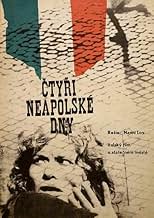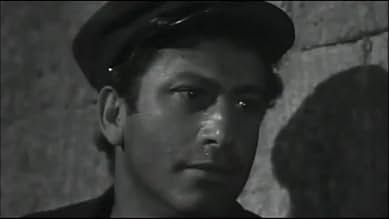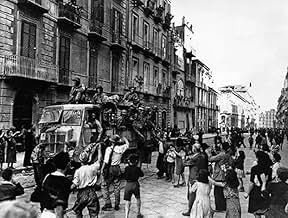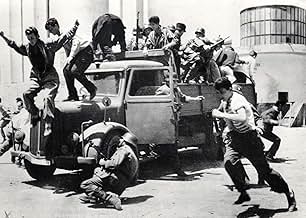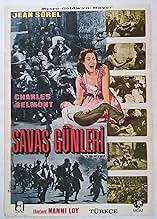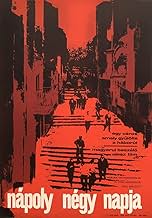VALUTAZIONE IMDb
7,6/10
1112
LA TUA VALUTAZIONE
La rivolta popolare napoletana contro gli invasori tedeschi durante la seconda guerra mondiale. In quattro giorni e poche ore vincono con fucili e pistole, armati di sassi, oggetti domestici... Leggi tuttoLa rivolta popolare napoletana contro gli invasori tedeschi durante la seconda guerra mondiale. In quattro giorni e poche ore vincono con fucili e pistole, armati di sassi, oggetti domestici e taniche di benzina.La rivolta popolare napoletana contro gli invasori tedeschi durante la seconda guerra mondiale. In quattro giorni e poche ore vincono con fucili e pistole, armati di sassi, oggetti domestici e taniche di benzina.
- Regia
- Sceneggiatura
- Star
- Candidato a 2 Oscar
- 9 vittorie e 9 candidature totali
Raffaele Barbato
- Giovanni Ajello
- (non citato nei titoli originali)
Charles Belmont
- Sailor
- (non citato nei titoli originali)
Regina Bianchi
- Concetta Capuozzo
- (non citato nei titoli originali)
Silvana Buzzanca
- Immacolata
- (non citato nei titoli originali)
Enzo Cannavale
- Partigiano
- (non citato nei titoli originali)
Luigi De Filippo
- Cicillo
- (non citato nei titoli originali)
Adriana Facchetti
- Scared Woman
- (non citato nei titoli originali)
Pasquale Fasciano
- Strongman
- (non citato nei titoli originali)
Domenico Formato
- Gennaro Capuozzo
- (non citato nei titoli originali)
Aldo Giuffrè
- Pitrella
- (non citato nei titoli originali)
Curt Lowens
- Sakau
- (non citato nei titoli originali)
Pupella Maggio
- Arturo's Mother
- (non citato nei titoli originali)
Rosalia Maggio
- Scared Woman
- (non citato nei titoli originali)
Alba Maiolini
- Grieving Woman
- (non citato nei titoli originali)
Lea Massari
- Maria
- (non citato nei titoli originali)
Recensioni in evidenza
"The Four Days of Naples" is an interesting film in that although it was made in 1962, it looks like it was made just after the war. That's because many buildings show bomb damage. Could they have sat that way since the war or did they blow up a few buildings to add to the realism? I don't know, but the film sure got the look right.
The film is set in 1943. The Allies have invaded Sicily and are on the move northward. In nearby Naples, word arrives that the Italian army has surrendered--and the residents are thrilled as it looks like the war is over for them. However, the Germans go immediately from allies to enslavers and they begin committing atrocities on the Italians. Soon, the Neopolitans realize that unless they fight back, they will die--thus begins four days of bloody fighting between mostly civilians and the German army throughout the streets of the town.
Because this was a battle to save he city, it's made up of lots and lots of separate vignettes all strung together. Some are very compelling--such as the boys of the reform school leaving to join in the fight--even though many look to be only about 10 or even younger. Others are more bizarre as there are TONS of women running about screaming and getting in the way of the fighting. About the only thing that did not ring true in these stories was when they showed a couple people pulling the pins out of grenades with their teeth---something that only occurs in movies and never in real life (you'd lose your teeth doing this).
This film works very well. Of course, much of this is because it was well-directed, but I also loved the neo-realistic style (though most films in this style were made a decade or more earlier)--with non-actors playing the parts of the citizens. While the film could have been like an American epic (such as "The Longest Day")--star-studded throughout, instead the real folks made it all come alive--like we are really watching the battles unfold. Realism--realistic looking deaths, heroism, occasional cowardice--realism from start to finish.
By the way, although it's a very good film, I would really love to see it re-captioned. That's because like many films captioned many years ago, the people doing this didn't feel a need to caption everything the people said or caption it word for word. I dislike this intensely--as would most film purists. I've seen much worse captioning--but also much, much better.
By the way, you can't blame the film makers, but the tanks used in the film were modern tanks like American-built Walker Bulldogs--not vintage German tanks. There just aren't that many Panzer tanks left and they certainly weren't going to risk the few possibly still available making a film.
The film is set in 1943. The Allies have invaded Sicily and are on the move northward. In nearby Naples, word arrives that the Italian army has surrendered--and the residents are thrilled as it looks like the war is over for them. However, the Germans go immediately from allies to enslavers and they begin committing atrocities on the Italians. Soon, the Neopolitans realize that unless they fight back, they will die--thus begins four days of bloody fighting between mostly civilians and the German army throughout the streets of the town.
Because this was a battle to save he city, it's made up of lots and lots of separate vignettes all strung together. Some are very compelling--such as the boys of the reform school leaving to join in the fight--even though many look to be only about 10 or even younger. Others are more bizarre as there are TONS of women running about screaming and getting in the way of the fighting. About the only thing that did not ring true in these stories was when they showed a couple people pulling the pins out of grenades with their teeth---something that only occurs in movies and never in real life (you'd lose your teeth doing this).
This film works very well. Of course, much of this is because it was well-directed, but I also loved the neo-realistic style (though most films in this style were made a decade or more earlier)--with non-actors playing the parts of the citizens. While the film could have been like an American epic (such as "The Longest Day")--star-studded throughout, instead the real folks made it all come alive--like we are really watching the battles unfold. Realism--realistic looking deaths, heroism, occasional cowardice--realism from start to finish.
By the way, although it's a very good film, I would really love to see it re-captioned. That's because like many films captioned many years ago, the people doing this didn't feel a need to caption everything the people said or caption it word for word. I dislike this intensely--as would most film purists. I've seen much worse captioning--but also much, much better.
By the way, you can't blame the film makers, but the tanks used in the film were modern tanks like American-built Walker Bulldogs--not vintage German tanks. There just aren't that many Panzer tanks left and they certainly weren't going to risk the few possibly still available making a film.
This good film tell a historical fact: the resistance of the people common of Naples against the Nazi, that they occupied the city in 1943, after the fall of Mussolini. Using only light weapons left by the Italian soldiers, they look for hopelessly to maintain the freedom, once the American soldiers are approximating if. For four days, the heroic resistance of popular gets to maintain the military situation in an impasse... Film of beautiful and touching images, as the father taking the dead combatant son in the arms to be veiled home; the people playing domestic objects of the windows on the Germans or the boys of the reformatory, rebelling and fleeing for they unite to the resistance. Unforgettable!!
10gort-8
Can you find the main character? I can't.
Like many of you, I love movies. In every film that I've seen; sound and silent, short and feature length, narrative and documentary, a main character emerges. Sometimes, like in Fail-Safe and Dr. Strangelove, more than one emerges as part of a shifting focus, usually against the backdrop of a grand narrative. I've never seen a film, with the possible exception of very early cinema and raw news footage, where there is not even a pretense at a central character.
Instead, the city of Naples itself is the main character. With no disrespect meant to the men and women of Naples who faced the German Army, it's as though the city itself becomes a dog shaking off its deadly fleas.
Mall Megaplexes are jammed with the same few films, with different casts and titles perhaps, but stories told with a very limited scope. I encourage you to sample what great cinema looks like when told from a completely unique viewpoint.
Like many of you, I love movies. In every film that I've seen; sound and silent, short and feature length, narrative and documentary, a main character emerges. Sometimes, like in Fail-Safe and Dr. Strangelove, more than one emerges as part of a shifting focus, usually against the backdrop of a grand narrative. I've never seen a film, with the possible exception of very early cinema and raw news footage, where there is not even a pretense at a central character.
Instead, the city of Naples itself is the main character. With no disrespect meant to the men and women of Naples who faced the German Army, it's as though the city itself becomes a dog shaking off its deadly fleas.
Mall Megaplexes are jammed with the same few films, with different casts and titles perhaps, but stories told with a very limited scope. I encourage you to sample what great cinema looks like when told from a completely unique viewpoint.
Every time I watch this movie I'm deeply moved by the many true to life characters you see depicted on the backdrop scenario of the struggle Napoli's citizens suffered to get rid of the Nazis' invasion and occupation.
Many of the characters are not fictitious: the child Gennaro Capuozzo was awarded the Gold Medal for Military Valor.
The cast is exceptional with many great actors and the minor ones act in a perfect way too. Even with the technical limitations of this movie, I find it engrossing and very close to the world famous Italian neorealism masterpieces such as Paisà and Roma Città Aperta.
I highly recommend it.
Many of the characters are not fictitious: the child Gennaro Capuozzo was awarded the Gold Medal for Military Valor.
The cast is exceptional with many great actors and the minor ones act in a perfect way too. Even with the technical limitations of this movie, I find it engrossing and very close to the world famous Italian neorealism masterpieces such as Paisà and Roma Città Aperta.
I highly recommend it.
10sissoed
I just saw this 1962 film on Turner Classic Movies and promptly tracked down and ordered a VHS of it. A very realistic film with many characters whose stories start and in most cases are left unresolved in the midst of the fighting. The screenplay was original for the screen, not based on any book, and received a 1963 Oscar nomination in the original screenplay category. There is a 1979 book with the same title, also telling of the uprising, that is NOT the source of this film. According to summaries, the book says that the Naples "street boys" instigated and led the rebellion. Not in this film, however, which focuses on adults and has many wrenching scenes of mothers and children, husbands and wives torn apart. The ensemble cast is passionate and convincing. Unlike the other commenter who said the film is an argument against war, this is really an argument for standing up and fighting against those who would treat you as slaves (which the NAZIs did and which led to the uprising). Great film!
Lo sapevi?
- QuizAll actors accepted to be uncredited in honor of the civilians who died during the uprising and remained without official recognition.
- BlooperAt the beginning of the scene in which Allejo and his gang of kids are having a shootout from the mountain train and Cazzillo gets shot, around 1h 31min, a piece of glass in front of him reflects the crew.
- Curiosità sui creditiWhen the MGM lion roars, no sound comes out of its mouth.
- ConnessioniEdited into Film socialisme (2010)
I più visti
Accedi per valutare e creare un elenco di titoli salvati per ottenere consigli personalizzati
- How long is The Four Days of Naples?Powered by Alexa
Dettagli
Botteghino
- Budget
- 800.000 USD (previsto)
- Tempo di esecuzione2 ore
- Colore
- Mix di suoni
- Proporzioni
- 1.66 : 1
Contribuisci a questa pagina
Suggerisci una modifica o aggiungi i contenuti mancanti

Divario superiore
What is the English language plot outline for Le quattro giornate di Napoli (1962)?
Rispondi
